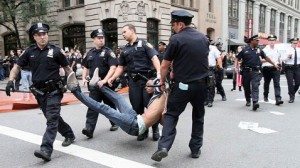
The Occupy Wall Street protests have been going on in lower Manhattan, with activists camping out and marching around the financial district. They self-describe as:
Occupy Wall Street is leaderless resistance movement with people of many colors, genders and political persuasions. The one thing we all have in common is that We Are The 99% that will no longer tolerate the greed and corruption of the 1%.
Media coverage has been mixed. First, the protests were ignored. Then they were criticized. They’re increasingly being lauded. I have mixed feelings, personally, about some of the tactics and the lack of coherent goals and the protestors comparing themselves to the Arab Spring activists, even while I support the protests and I’m on board with their general grievances pertaining to the prioritization of corporations over people and a government that allows corporate greed to go unchecked while millions of Americans struggle to make ends meet. Like Samhita says over at Feministing, “You can say what you will about protests that are not strategic or focused and those are legitimate critiques – but the fundamental power of protesting when all other avenues have failed us is important to any semblance of democracy we might have, whether it be a strategic single issue protest or a faceless unanimous mass uprising. If protesters aren’t listened to, represented or covered, we have all but lost our voice.”
Regardless of how I feel about the relative merits of some aspects of Occupy Wall St. — and regardless of whether you think the protestors are reclaiming the future or are a bunch of hippie socialists — we should all be concerned with how the NYPD is handling the situation. The protests have been, by almost all accounts, peaceful, even if the protestors didn’t have a permit. The NYPD is nonetheless making mass arrests, using mace, and manhandling protestors. That kind of disproportionate response should scare all of us — especially when much of the media coverage has amounted to, “Well the protestors are a bunch of spoiled children anyway.”
Look at the pictures and tell me that seems right. Try to envision Tea Party activists or even abortion clinic protestors — two groups that routinely protest without permits, and with varying degrees of peacefulness — being maced, arrested en masse, violently thrown to the ground, or roughly dragged down the street.
It doesn’t happen. It shouldn’t happen. And it shouldn’t happen to left-wing protestors in lower Manhattan, either.
A terrifying number of important rights and liberties have been curtailed in the United States over the past ten years, often under the guise of keeping us safe or fighting evil. For the most part, Americans have looked the other way. But when peaceful protests are met with violence, and when force is used to silence political grievances, we all lose. Protests and public assemblies are such fundamental parts of the American story that they’re protected in the Constitution. For centuries they’ve been a major avenue through which we’ve achieved social change, or at least voiced our opinions. No matter what our political positions or our feelings about any particular group of activists, it should give us pause when a peaceful protestor has to decide if speaking her mind — or just showing up — is worth getting maced, arrested and brutalized. In looking at the photos and reading the accounts of the actions taken against the Occupy Wall St protestors, even the most right-wing among us should be disturbed. We should all be angry.